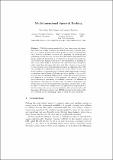| dc.contributor.author | Weiss, Yair | |
| dc.contributor.author | Fergus, Robert | |
| dc.contributor.author | Torralba, Antonio | |
| dc.date.accessioned | 2019-08-07T12:59:21Z | |
| dc.date.available | 2019-08-07T12:59:21Z | |
| dc.date.issued | 2012-10 | |
| dc.identifier.isbn | 9783642337147 | |
| dc.identifier.uri | https://hdl.handle.net/1721.1/121970 | |
| dc.description.abstract | With the growing availability of very large image databases, there has been a surge of interest in methods based on "semantic hashing", i.e. compact binary codes of data-points so that the Hamming distance between codewords correlates with similarity. In reviewing and comparing existing methods, we show that their relative performance can change drastically depending on the definition of ground-truth neighbors. Motivated by this finding, we propose a new formulation for learning binary codes which seeks to reconstruct the affinity between datapoints, rather than their distances. We show that this criterion is intractable to solve exactly, but a spectral relaxation gives an algorithm where the bits correspond to thresholded eigenvectors of the affinity matrix, and as the number of datapoints goes to infinity these eigenvectors converge to eigenfunctions of Laplace-Beltrami operators, similar to the recently proposed Spectral Hashing (SH) method. Unlike SH whose performance may degrade as the number of bits increases, the optimal code using our formulation is guaranteed to faithfully reproduce the affinities as the number of bits increases. We show that the number of eigenfunctions needed may increase exponentially with dimension, but introduce a "kernel trick" to allow us to compute with an exponentially large number of bits but using only memory and computation that grows linearly with dimension. Experiments shows that MDSH outperforms the state-of-the art, especially in the challenging regime of small distance thresholds. | en_US |
| dc.description.sponsorship | International Science Foundation | en_US |
| dc.description.sponsorship | Sloan Foundation Fellowship | en_US |
| dc.language.iso | en | |
| dc.publisher | Springer Berlin Heidelberg | en_US |
| dc.relation.isversionof | 10.1007/978-3-642-33715-4_25 | en_US |
| dc.rights | Creative Commons Attribution-Noncommercial-Share Alike | en_US |
| dc.rights.uri | http://creativecommons.org/licenses/by-nc-sa/4.0/ | en_US |
| dc.source | MIT web domain | en_US |
| dc.title | Multidimensional Spectral Hashing | en_US |
| dc.type | Book | en_US |
| dc.identifier.citation | Weiss, Yair, Rob Fergus, and Antonio Torralba. "Multidimensional Spectral Hashing." In Proceeding ECCV'12 Proceedings of the 12th European conference on Computer Vision, Florence, Italy, October 07-13, 2012. Part V, ACM, ©2012, pp. 340-353. ©2012 The Author(s) | en_US |
| dc.contributor.department | Massachusetts Institute of Technology. Computer Science and Artificial Intelligence Laboratory | en_US |
| dc.relation.journal | Proceeding ECCV'12 Proceedings of the 12th European conference on Computer Vision | en_US |
| dc.eprint.version | Author's final manuscript | en_US |
| dc.type.uri | http://purl.org/eprint/type/ConferencePaper | en_US |
| eprint.status | http://purl.org/eprint/status/NonPeerReviewed | en_US |
| dc.date.updated | 2019-07-11T15:42:18Z | |
| dspace.date.submission | 2019-07-11T15:42:19Z | |
| mit.journal.volume | V | en_US |
